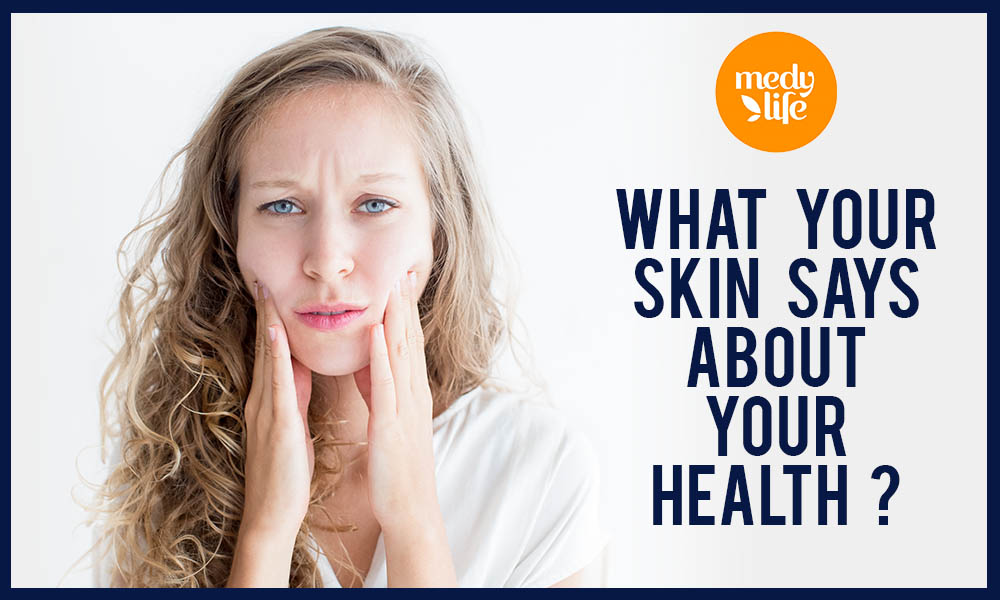
Skin and Health: What does your skin say about your health?
11-09-2018 | Posted By: Dr Sareeta Parker | 3910 View(s)
Skin and health: Does skin say anything about our health? Yes, it does! Our skin is amazing and the largest organ of our body. It protects us against infections, regulates body temperature and warns us about the coming danger. Like, when you accidentally touch a hot thing, your skin warns your brain about the burn. Our skin acts as a barrier to keep the harmful bacteria out.
Since skin is an essential organ of our body, having a healthy skin gives us a glowing, youthful look. When you start noticing wrinkles and discolouration, you often blame it on ageing, but it is not always like that. Our skin gives us hints as to what is going on inside our body. Many health conditions start with skin changes, so you must be on a lookout for even smallest of the things. Here is an article on a few things that the skin tells us about our health.
What is the relation between skin and health?
1. Allergies
Our skin protects us from various threats. Allergies lead to hives and itchy skin, and that damages the skin. Hives are red bumpy, blotchy areas over the body. These are caused due to anything that we are allergic to, for example, food, pets, medication, insect stings and pollen from flowers.
2. Pale Skin
If you get that pasty complexion, especially around your face, you can blame it on the deficiency of iron. This situation is known as anaemia. Anaemia causes low iron levels in the blood, and as a result, your skin on the face and hands lose colour. Iron-rich foods like dark green vegetables, red meat, eggs can help increase the levels of iron. Consult a physician if you are observing the symptoms of anaemia.

3. Itchy and Dry Skin
Psoriasis is a condition when the skin gets itchy and dry all over the body, but your nails could also tell the condition of your body. If your nails get deformed and turn yellowish or brown, then it might be an indicator of psoriasis or psoriatic arthritis. So, if your nails are not in shape anymore, it is time to get checked.
4. Excessive Hair Growth on Body
If you have been observing a lot of hair on your body and cystic acne, then you might be suffering from PCOS. PCOS/PCOD is a hormone imbalance situation, and about 70 per cent of women suffer from this condition. It involves excessive hair growth usually on the face and chest. PCOS also affects irregular periods and leads to infertility. It is best if you get yourself checked as early as possible.
5. Baggy Eyes
Skin and health: Are they related? Yes, they are! Our skin under eyes tells a lot about our health. If you are someone who continuously experiences baggy eyes and dark circles under the eyes, then we got you the actual reason why it could be happening to you.

It is because eating salty food in excess makes your body retain fluid, and this shows under the eyes. The skin under the eyes is highly sensitive, and hence it shows even if there is a minor change in there.
6. Butterfly Rash
Lupus is a chronic immune system disorder where the body attacks its organs and tissues. It mainly causes inflammation, and this can affect different body parts including your joints, kidneys, blood cells, brain, etc.
It mainly affects your skin, blood and kidneys. One of the common signs of this disorder is the butterfly rash. This kind of rash is distinguishable. If you observe it, it is time that you should visit your doctor.
7. Moles
Skin and health are related to each other because moles are a way of telling us that something is wrong with our health. Moles are surely good looking, but too many of them can be dangerous although they seem harmless. If a mole stays the same and doesn’t change over time, it is harmless.
But if this mole keeps changing its shape and size over time, it could be a sign of skin cancer. Look for moles in your body that are asymmetrical, have uneven borders and are larger than a quarter than an inch. These kinds of moles keep changing over time, and therefore, you must keep a check on your moles.
8. Wrinkles
You are not even 40 yet and have started experiencing wrinkles already? A study discovered that those postmenopausal women who have deep wrinkles in their faces and necks have a high probability of having low bone density. Our skin looks fresh and bouncy because of the collagen. If collagen is missing from the skin, it might also be missing from the bones. You need to consult a doctor if you experience deep wrinkles. To keep your bones strong you must exercise regularly and consume enough calcium.
9. Rashes and Blisters
Have you been experiencing burning rashes and tiny blisters in your skin lately? Well, if you have been scratching your skin off, then you must take a stroll down the gluten-free diet for a few days. These burning rashes and blisters are known as dermatitis herpetiformis, and it occurs in people with celiac disease. If you have rashes but do not experience gluten intolerance, you must visit your doctor as soon as possible.
10. Dry Skin
Another reason why skin and health are connected with each other is that dry skin is a sign of health problems. People with diabetes have uncontrolled blood sugar levels because of improper insulin function. This leads to the changes in skin and blood vessels and causes plaques.
Is Dry Skin Bothering You? Try These Homemade Hydrating Masks for Dry Skin
Diabetes is responsible for numbness in skin, especially in the limbs. That happens because the blood circulation is decreased. This numbness in the skin is so strong that you can get a cut and may not realise that it is bleeding until you see it. Skin gets rough and dry, and wounds do not heal too fast.
11. Change in Colour of the Skin
We often notice that tanning orange hue in people who have a thyroid disorder. This condition is due to the low thyroid in men and women. Beta-carotene containing foods such as carrots and sweet potatoes are processed in the thyroid. When the thyroid gland is not working effectively, the beta-carotene builds up in the blood and makes our skin to appear orange in colour.
Low thyroid levels can also make your nails appear brittle and hair dull. Fatigue and intolerance to hot and cold are also one of the symptoms. There is hair loss when the thyroid is high.
This was about what is the connection between skin and health. We discussed 11 signs of unhealthy that our skin shows. So if you notice any rash or skin problems, book a health checkup package now and consult a doctor to know the cause of the skin problem. Because prevention is better than cure.


